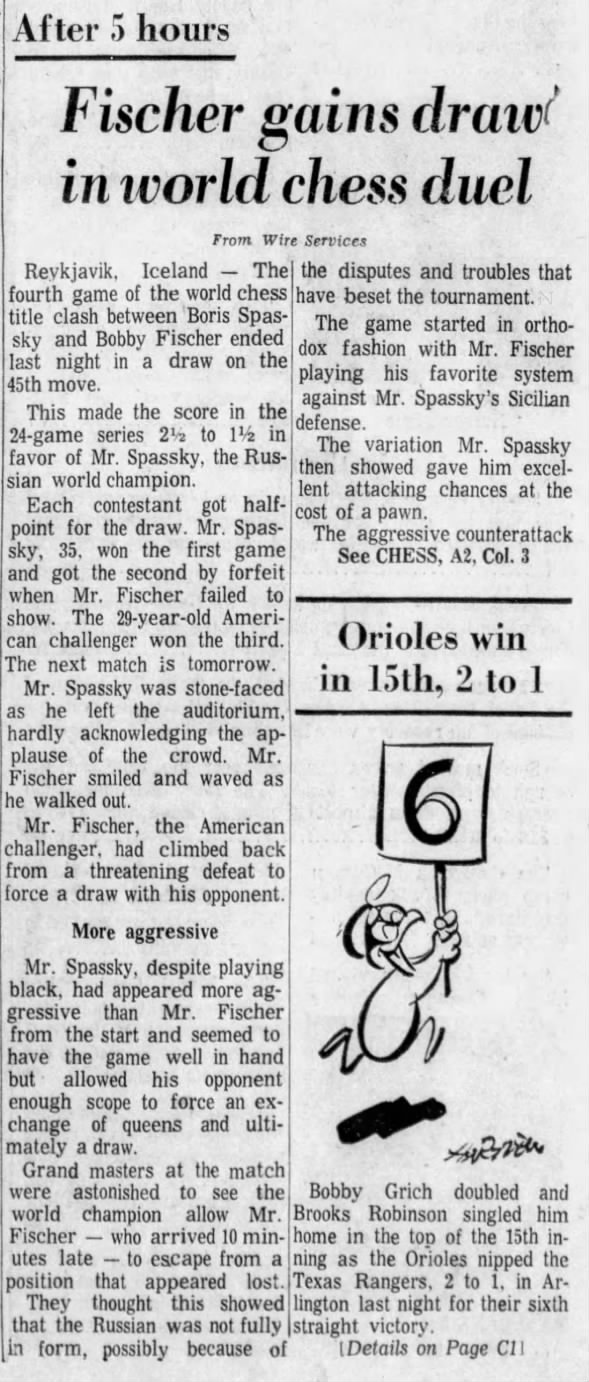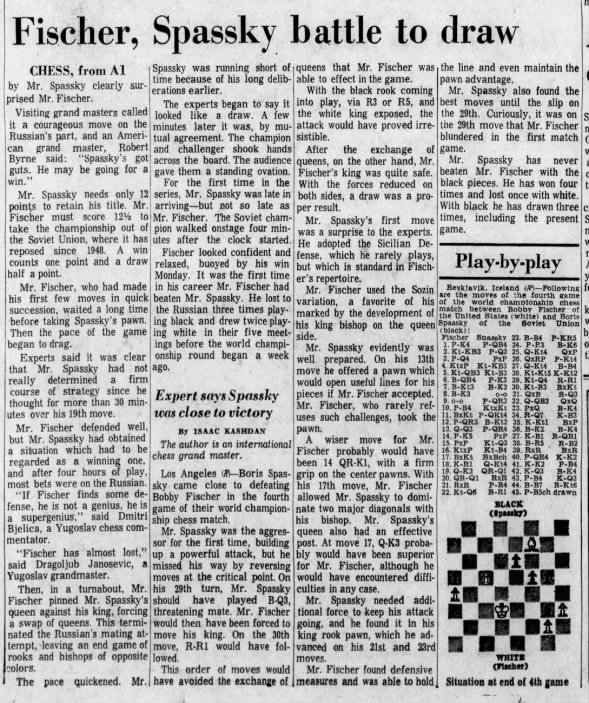The Baltimore Sun Baltimore, Maryland Wednesday, July 19, 1972 - Page 2
After 5 Hours: Fischer Gains Draw in World Chess Duel
Reykjavik, Iceland — The fourth game of the world chess title clash between Boris Spassky and Bobby Fischer ended last night in a draw on the 45th move.
This made the score in the 24-game series 2½ to 1½ in favor of Mr. Spassky, the Russian world champion.
Each contestant got half-point for the draw. Mr. Spassky, 35, won the first game and got the second by forfeit when Mr. Fischer failed to show. The 29-year-old American challenger won the third. The next match is tomorrow.
Mr. Spassky was stone-faced as he left the auditorium, hardly acknowledging the applause of the crowd. Mr. Fischer smiled and waved as he walked out.
Mr. Fischer, the American challenger, had climbed back from a threatening defeat to force a draw with his opponent.
More Aggressive
Mr. Spassky, despite playing black, had appeared more aggressive that Mr. Fischer from the start and seemed to have the game well in hand but allowed his opponent enough scope to force an exchange of queens and ultimately a draw.
Grand masters at the match were astonished to see the world champion allow Mr. Fischer — who arrived 10 minutes late — to escape from a position that appeared lost.
They though this showed that the Russian was not fully in form, possibly because of the disputes and troubles that have beset the tournament.
The game started in orthodox fashion with Mr. Fischer playing his favorite system against Mr. Spassky's Sicilian defense.
The variation Mr. Spassky then showed game him excellent attacking chances at the cost of a pawn.
The aggressive counterattack by Mr. Spassky clearly surprised Mr. Fischer.
Visiting grand masters called it a courageous move on the Russian's part, and an American grand master, Robert Byrne said: “Spassky's got guts. He may be going for a win.”
Mr. Spassky needs only 12 points to retain his title. Mr. Fischer must score 12½ to take the championship out of the Soviet Union, where it has reposed since 1948. A win counts one point and a draw half a point.
Mr. Fischer, who had made his first few moves in quick succession, waited a long time before taking Spassky's pawn. Then the pace of the game began to drag.
Experts said it was clear that Mr. Spassky had not really determined a firm course of strategy since he thought for more than 30 minutes over his 19th move.
Mr. Fischer defended well, but Mr. Spassky had obtained a situation which had to be regarded as a winning one, and after four hours of play, most bets were on the Russian.
“If Fischer finds some defense, he is not a genius, he is a supergenius,” said Dmitri Bjelica, a Yugoslav chess commentator.
“Fischer has almost lost,” said Dragoljub Janosevic, a Yugoslav grandmaster.
Then, in a turnabout, Mr. Fischer pinned Mr. Spassky's queen against his king, forcing a swap of queens. This terminated the Russian's mating attempt, leaving an end game of rooks and bishops of opposite colors.
The pace quickened. Mr. Spassky was running short of time because of his long deliberations earlier.
The experts began to say it looked like a draw. A few minutes later it was, by mutual agreement. The champion and challenger shook hands across the board. The audience gave them a standing ovation.
For the first time in the series, Mr. Spassky was late in arriving—but not so late as Mr. Fischer. The Soviet champion walked onstage four minutes after the clock started.
Fischer looked confident and relaxed, buoyed by his win Monday. It was the first time in his career Mr. Fischer had beaten Mr. Spassky. He lost to the Russian three times playing white in their five meetings before the world championship round began a week ago.
 Fischer Gains Draw In World Chess Duel 19 Jul 1972, Wed The Baltimore Sun (Baltimore, Maryland) Newspapers.com
Fischer Gains Draw In World Chess Duel 19 Jul 1972, Wed The Baltimore Sun (Baltimore, Maryland) Newspapers.com
 Fischer, Spassky Battle to Draw 19 Jul 1972, Wed The Baltimore Sun (Baltimore, Maryland) Newspapers.com
Fischer, Spassky Battle to Draw 19 Jul 1972, Wed The Baltimore Sun (Baltimore, Maryland) Newspapers.com
























